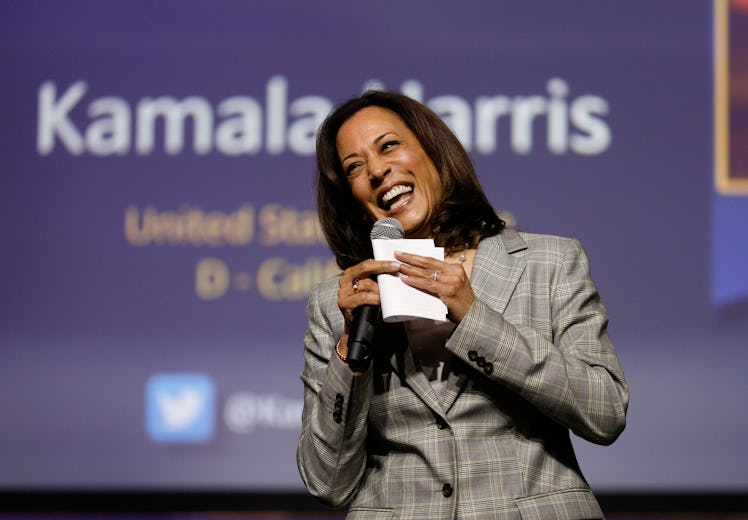
Kamala Harris' Plan To Tackle Student Debt Is Very Specific
On Tuesday, July 30, candidates will take the stage for the second round of the 2020 Democratic presidential debates. One candidate has unveiled a student debt plan just ahead of the political showdown, but it hasn't been as well-received as other candidates' plans. So, what's in Kamala Harris' student debt plan? Here's the rundown.
On Sunday, July 28, Sen. Kamala Harris of California announced via Twitter her plan to eliminate student loan debt and bolster student loan forgiveness programs. According to her plan, Harris will invest $60 billion in science, technology, engineering, and mathematics (STEM) education at historical black colleges and universities (HBCU) as well as minority-serving institutions (MSI). That $60 billion will go toward creating a $10 billion infrastructure grant program for HBCUs and MSIs, and a $50 billion fund at the Department of Education to help higher-education institutions set up STEM programs. Harris also plans to direct the Pentagon to assist these institutions with research opportunities.
And that's not all. Harris states that she plans to work with Congress to create a $12 billion capital grant and technical support program that will help small, minority-owned businesses without the pressure of student debt. Her student loan forgiveness program will forgive up to $20,000 of college debt for Pell Grant recipients who "start a business that operates for three years in disadvantaged communities." This program will also help recipients defer all of their student loan debt, interest-free, up to three years for those starting businesses.
Ultimately, Harris' plan could have a huge impact on black business owners and entrepreneurs if it actually becomes a reality.
Despite Harris' comprehensive plan, some critics have pointed out that the California senator's student debt plan has some hiccups, particularly the assumption that small business owners will end up being successful. For context, Pell Grants are given to students from low-income households, which can provide over $6,000 for one school year. While Harris' plan would help minority-owned small businesses that succeed after college, the chances of that happening are statistically low. According to an August 2018 Frequently Asked Questions (FAQ) from the U.S. Small Business Administration (SBA), nearly 80% of small businesses survive after the first year, but the numbers drop drastically after that. Only half of small businesses survive after five years of being active, and one-third survive after 10 years. So, while Harris' plan could help some, there's no telling how it will help in the long run.
One thing is for sure: Harris' plan is drastically different than fellow Democratic candidates' student debt proposals. So far, progressive Democratic candidates Sen. Bernie Sanders of Vermont and Sen. Elizabeth Warren of Massachusetts have both announced proposals that would entirely eliminate student loan debt for college graduates. Warren's plan is similar to Harris' in the sense that both candidates aim to close wealth gaps in their proposal, but Warren's proposal pushes for free college tuition at two- and four-year public universities in an effort to make education more accessible to all students.
As the 2020 presidential election heats up, I doubt this will be the last student debt proposal citizens hear from other candidates. Make sure to tune in Tuesday, July 30 and Wednesday, July 31 for the second round of Democratic debates.